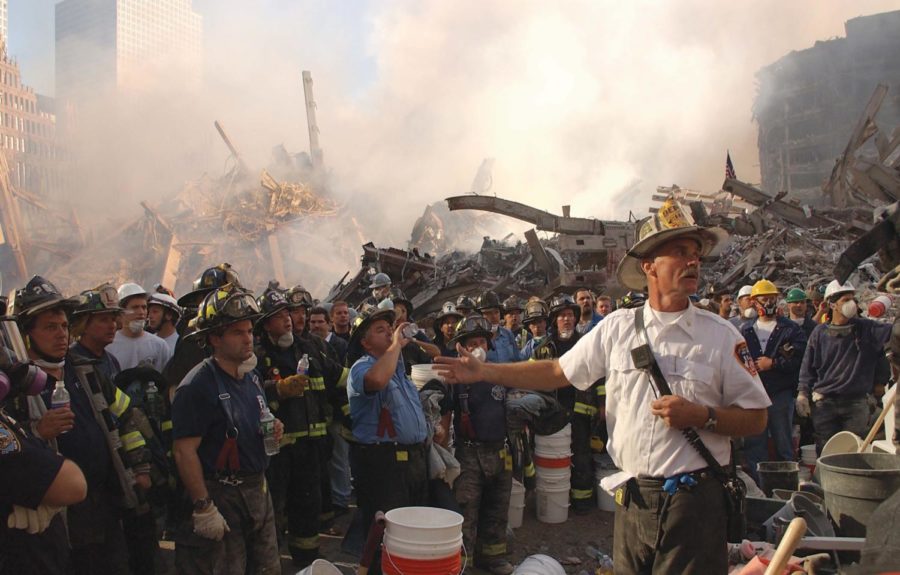Snell: Where have all the heroes gone?
Photo courtesy of Andrea Booher/ FEMA Photo News
New York City, NY, September 13, 2001 — A New York City Fire Chief addresses firefighters concerning the shifting of surrounding buildings at the World Trade Center crash site.
January 18, 2012
Everybody loves a hero, but do we even know what a hero is anymore?
Webster’s defines a hero as a mythological person endowed by the gods with special abilities, a great warrior, someone admired for their qualities, or someone who shows courage in a time of need. While these definitions are all true, I believe they fall short of defining what a hero truly is.
Most telling about American society is the last definition Webster’s gives, “an object of extreme admiration and devotion; an idol.” Reread that one and think about it for a moment.
Pop culture is chock full of people media tells us we ought to admire, devote our attentions to and idolize. We even have television shows openly geared toward this goal, such as “American Idol.” Singing talent is indeed very admirable, however Kelly Clarkson is definitely not a hero.
There’s a difference between fame and heroism.
Heroism has its roots in military service. In ancient times, the average person had few ways to be heroic, but serving in the military was one means a person had to elevate himself and raise his status from the plebian to heroic, and be remembered eternally.
That the hero was important in classical times is no mystery. Ancient tales of heroism endure with us to this very day. We can still read about Achilles, Odysseus and Aeneas nearly 3,000 years after Homer and Virgil wrote their stories. Their legends are as exciting as adventure tales can get, with more killing, sex, mystery and intrigue than you’re likely to find in the most scandalous action movie today.
But what makes a hero a hero?
Heroism is connected to the ancient Greek notion of action. In order to be a hero, one must first act. Only through action will a potential hero create the conditions or put himself in a position to be heroic. This is why military service has always been related to heroism, as action in battle provides the necessary extreme conditions for heroism to be possible.
However, action alone does not a hero make.
I know I’ll be lambasted for this, but the terrorist attacks on Sept. 11 fundamentally changed the way we look at heroism, and sadly for the worst. Despite prevailing beliefs, police and firemen, while admirable and respectable people, are not heroes by default. Soldiers, while also respectible, are likewise not automatically heroes.
This is because doing one’s job is not by itself heroic. Entering burning buildings is what firefighters do. Intervening in a hostage crisis is what police do. Engaging and killing the enemy is what soldiers do. What links police work, fire fighting and military service to heroism is the sense of duty and the courage required to take the job in the first place, and putting oneself out there in a position to act.
Doing what is right and having the courage to do it when necessary are critical elements of heroism, but not the ultimate defining qualities. The military understands this; one need only read medal citations. In them you’ll find phrases like “going above and beyond the call of duty.”
It’s no coincidence that men earn the Medal of Honor for evacuating a dozen wounded comrades, knocking out a couple machine gun emplacements, killing 60 of the enemy, capturing 20 more and doing all of this while wounded four separate times, armed only with three grenades and a pistol.
If you think that’s exaggeration, you ought to read some Medal of Honor citations. These types of actions are not the sort of thing the average infantryman does in the conduct of a battle, yet it is average infantrymen who do them from time to time. That’s what makes them heroes over other soldiers.
These last points reveal what are perhaps the final critical characteristics of a hero: There must be an element of risk, and the hero must have common roots. We love heroes because they are normal, average people just like us, who risk much, including their lives, to do what needs to be done.
What do we revere more? The firefighter who pulls a child from a burning building? Or some guy who just happened to be walking by on the way to the grocery store, who runs into the fire without protective gear or oxygen and brings the kid out through the blaze?
A hero must be one of us. They must have a strong sense of morality, ethics and duty, so they may instantly identify right and wrong and the need for action. A hero must possess the courage and intestinal fortitude to then act — and act they must — even at great danger to themselves.
Where have men like the American founders gone? Where are people like the citizen soldiers who jumped into Normandy and literally saved the world? Where are folks like the Apollo astronauts who dared to sit atop the most powerful and dangerous machine ever created and flew to the moon?
For our lives and actions to have meaning, we must stop idolizing the rich, famous and undeserving, for their deeds, no matter how good, are unworthy of the label “heroic.” We must recall and bring back the true hero, and pay them the respect they deserve.
This is America. We are a nation defined by heroism. It’s time we remembered that and began acting like it again.
Long live the hero.

















